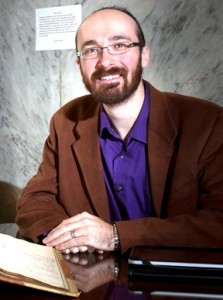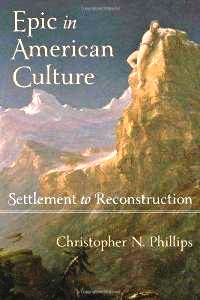A “stupid” mistake turned into one of Christopher Phillips’ smartest discoveries during the research process for his new book, Epic in American Culture, Settlement to Reconstruction (The Johns Hopkins University Press, 2012).

Professor Chris Phillips
Phillips first visited the U.S. Supreme Court building on a Saturday, only to find the building, of course, closed. But serendipity was on his side. On the huge, cast-bronze doors, which would have been retracted into the wall during business hours and thus not visible, is a courtroom scene taken from the Shield of Achilles in Homer’s The Iliad.
“Epic was cast, literally, into the Supreme Court’s own architecture and history, and that door was made in the early 20th century,” says Phillips, assistant professor of English. “I couldn’t have found a better example of epic’s continued influence in understanding the meaning of the Constitution.”
A trio of students working through the EXCEL Scholars undergraduate research program helped Phillips complete the book. American studies and English graduate Katie Thompson ’09 and psychology and English graduate Nicole Ceil ’11 traveled with him to the New York Public Library, New-York Historical Society, Metropolitan Museum of Art, National Academy of Design, Pennsylvania Academy of Fine Arts, Library Company of Philadelphia, and other locations to gather information on art, the Constitution, and women epic writers.
Together, they sifted through exhibition catalogs, curatorial notes, manuscript letters and poems, and rare books to develop ideas about the material and contextualize the paintings within their findings. English graduate Lauren Scott ’12 helped proofread the manuscript and prepare the index.
“Research for me is a matter of imagination and curiosity that happens to involve some hard work and citation rules, and if I can help students see it in that light, they will be in great shape for anything they do after my class having to do with gaining or communicating knowledge,” Phillips says. “Since I also teach a great deal of writing, it’s important for me to keep active as a writer. Sometimes a student will learn how to make a move or rethink a problem in a paper after hearing my own stories of wrestling with writing, or seeing an example of a writing problem in my own work. It shows students that even professional writers are still figuring out what they’re doing.”
 Phillips began delving into the epic’s influence on American culture for his dissertation at Stanford University as a way to answer questions that arose during his studies: Where did the European tradition of epic go in American literature? How did writers like Herman Melville blend epic with other literary forms? But, Phillips found, epic also spilled into other facets of culture. It became a way of thinking about constitutional interpretation in the nation’s early years as well as a term in art criticism.
Phillips began delving into the epic’s influence on American culture for his dissertation at Stanford University as a way to answer questions that arose during his studies: Where did the European tradition of epic go in American literature? How did writers like Herman Melville blend epic with other literary forms? But, Phillips found, epic also spilled into other facets of culture. It became a way of thinking about constitutional interpretation in the nation’s early years as well as a term in art criticism.
“In a sense, epic helped create American culture as we know it today,” Phillips says.
Epic, he explains, was the undisputed prestige literary form in the West when the U.S. came into being. American authors trained in British and French thought as well as the classics gravitated toward epic to declare cultural independence, establish identity, and even reform American English. Phillips argues that epic is more than a literary device; it influences society’s thought. Whoever controls the narratives of a society, Phillips says, controls society itself, something evidenced in everything from politics to pop culture.
“To be effective agents in the world, it’s important to get to know stories very, very well: where they come from, how they work, how they change, how you can preserve them and talk about them and retell them,” he says. “And epic works present themselves as a self-consciously high-stakes kind of story: This will explain being Greek to you (Homer), or the soul’s journey to God (Dante), or the deep spiritual roots of being English (Spenser). These kinds of narratives drive Hollywood’s top hits, election rhetoric, blurbs on New York Times bestsellers’ covers, histories of the Founding Fathers that are taught in schools and argued across picket lines. To understand why Americans are so attached to epic storytelling and what it’s done to and through our history helps us see why literature matters.”
With there previously being only one book, now over 20 years old, on American epic writing pre-20th century, Phillips’ work is full of new discoveries. For instance, he explores the range of epic poems penned by women writers, a phenomenon often denied by earlier scholars. One writer, Margaret Junkin Preston, got her start as a poet on Lafayette’s campus in the 1840s, a story Phillips hopes to explore further. He also made a rare new contribution to what is known about Melville’s materials in writing Moby-Dick. He tracked down the model for the doubloon that Ishmael and the crew reflect on in Melville’s classic and reveals that the other side of the coin depicted the goddess of liberty, something Melville would have known and purposefully hid from the reader.

 Phillips began delving into the epic’s influence on American culture for his dissertation at Stanford University as a way to answer questions that arose during his studies: Where did the European tradition of epic go in American literature? How did writers like Herman Melville blend epic with other literary forms? But, Phillips found, epic also spilled into other facets of culture. It became a way of thinking about constitutional interpretation in the nation’s early years as well as a term in art criticism.
Phillips began delving into the epic’s influence on American culture for his dissertation at Stanford University as a way to answer questions that arose during his studies: Where did the European tradition of epic go in American literature? How did writers like Herman Melville blend epic with other literary forms? But, Phillips found, epic also spilled into other facets of culture. It became a way of thinking about constitutional interpretation in the nation’s early years as well as a term in art criticism.